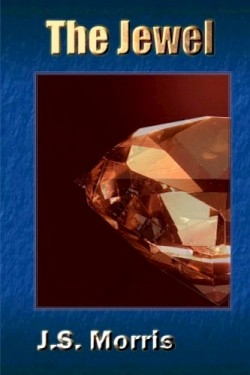The Jewel
Somewhere in the Pacific Northwest 130 years into the future thirteen-year-old orphan Alex Mic his trusty friend Spenser and his robot Timn (essentially a C3PO with an array of integrated weaponry) come into possession of one of the seven magic jewels hidden centuries before by the master wizard George Micn. The gem is capable of supplying an incredible amount of power to whatever object it’s applied to.
The heroes lose the prize almost immediately to Ace Jackson who is earnestly described and editorialized as: “…a multi-trillionaire who had a strong tendency to seek the power to control everyone and everything around him (exactly like an evil guy should be).” Rich from stealing the inventions of smarter but weaker people Ace fires henchfolk faster than Donald Trump does. He shouldn’t though because the heroes receive terrific information and considerate hospitality from Ace’s former flunkies. This is exactly the type of comic book bad guy who is bound to be caught soliloquizing his own diabolical brilliance one day. He certainly has the cackle down cold: “‘You want to get that jewel; well you’re going to have to go through me! Bo-ha ha ha haaa!!!’”
Morris’s fairly optimistic view of the twenty-second century reclassifies eighty-year-olds as middle aged and features buses with onboard cafes. In many ways the time is the embodiment of fulfilled wishes. It is a stable period similar to the current era except that substantial leaps in electromagnetic knowledge have made the range of both dangers and kids’ capabilities wider than ever. Technologies incorporated into the plot are based on advances in string theory. They include force field shields and antigravity machines; even teleportation is in the beta-testing stage. Timn the robot can fire nylon netting from a fingertip &224; la Spiderman but he’s still imperfect psychologically. Alex tells Timn “‘I need to reprogram you to be more positive.’”
Phrasing and homonym slip-ups happen pretty often and unlikely lucky coincidences abound but it’s all par for the course. A tone of campy exuberance carries the action along without unneeded navel-gazing even if nitpickers might wish for the involvement of a conscientious editor. This book ends as if it were ready to move immediately into the next installment. The Jewel is a fun story told very much in the voice of a kid explaining to other kids which for many young readers is more welcome than being talked down to by crusty adults who can’t remember what it felt like to believe in their ability to meet any challenge.
Reviewed by
Todd Mercer
Disclosure: This article is not an endorsement, but a review. The publisher of this book provided free copies of the book and paid a small fee to have their book reviewed by a professional reviewer. Foreword Reviews and Clarion Reviews make no guarantee that the publisher will receive a positive review. Foreword Magazine, Inc. is disclosing this in accordance with the Federal Trade Commission’s 16 CFR, Part 255.

